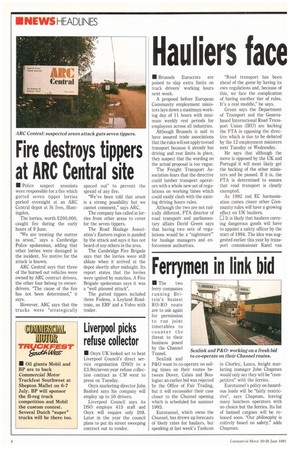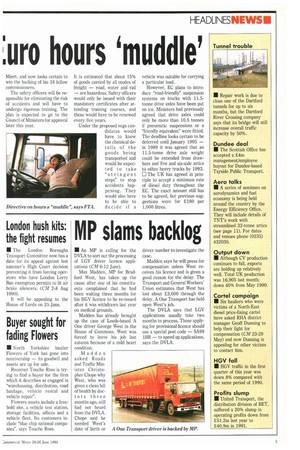Hauliers face :uro hours 'muddle'
Page 6

Page 7

If you've noticed an error in this article please click here to report it so we can fix it.
• Brussels Eurocrats are poised to slap extra limits on truck drivers' working hours next week.
A proposal before European Community employment ministers lays down a maximum working day of 11 hours with minimum weekly rest periods for employees across all industries.
Although Brussels is said to have assured trade associations that the rules will not apply to road transport because it already has driving and rest limits in place, they suspect that the wording on the actual proposal is too vague.
The Freight Transport Association fears that the directive could lumber transport operators with a whole new set of regulations on working times which could easily clash with the existing driving hours rules.
Although the two are not radically different, FTA director of road transport and parliamentary affairs David Green says that having two sets of regulations would be a "nightmare"' for haulage managers and enforcement authorities. "Road transport has been ahead of the game by having its own regulations and, because of this, we face the complication of having another tier of rules. It's a real muddle," he says.
Green says the Department of Transport and the Genevabased International Road Transport Union (TRU) are backing the FTA in opposing the directive which is due to be debated by the 12 employment ministers next Tuesday or Wednesday.
He says that although the move is opposed by the UK and Portugal it will most likely get the backing of the other ministers and be passed. If it is, the FTA is determined to ensure that road transport is clearly exempted.
As 1992 and EC harmonisation comes closer other Community rules will have a growing effect on UK hauliers.
It is likely that hauliers carrying dangerous goods will have to appoint a safety officer by the start of 1994. The idea was suggested earlier this year by transport commissioner Karel van Miert, and now looks certain to win the backing of his 16 fellow commissioners.
The safety officers will be responsible for eliminating the risk of accidents and will have to undergo rigorous training. The plan is expected to go to the Council of Ministers for approval later this year. It is estimated that about 15% of goods carried by all modes of freight — road, water and rail — are hazardous. Safety officers would only be issued with their mandatory certificates after attending training courses, and these would have to be renewed every five years.
Under the proposed regs candidates would have to know the chemical details of the goods being transported and would be expected to take "stringent steps" to stop accidents happening. They would also have to be able to decide if a vehicle was suitable for carrying a particular load.
However, EC plans to introduce "road-friendly' suspension systems on trucks with 11.5tonne drive axles have been put on ice. Ministers had previously agreed that drive axles could only be more than 10.5 tonnes if pneumatic suspensions or a "friendly equivalent" were fitted. The deadline looks certain to be deferred until January 1995 — in 1989 it was agreed that an 11.5-tonne drive axle weight could be extended from drawbars and five and six-axle artics to other heavy trucks by 1993.
The UK has agreed in principle to accept a minimum rate of diesel duty throughout the EC. The exact amount still has to be agreed, but previous suggestions were for £180 per 1,000 litres.
























































































